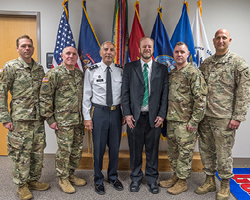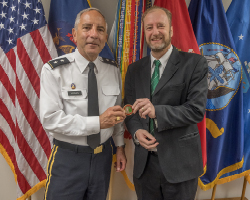Community Engagement Scholarship Award Honors University-Military Collaboration

(From left) Michigan Army National Guard Chief Warrant Officer 2 Ron Hatchew, State Family Program Director, ; Lieutenant Colonel Gregory Cooper, Deputy Director for Personnel; Major General Gregory Vadnais, Adjutant General; Adrian Blow, MSU Professor; Major Nick Anderson, former State Family Program Director, Colonel Mark Tellier, Chief of Staff, Michigan Army National Guard.
- Adrian Blow, Ph.D.
- Professor, Department of Human Development and Family Studies
- College of Social Science
- Michigan Army National Guard
- State Family Programs
The 2018 Community Engagement Scholarship Award recognizes Adrian Blow and his longstanding collaboration with the Michigan Army National Guard.
Since October 2006, Blow has worked with a range of community partners to address the challenges of reintegration faced by returning National Guard soldiers and their families.
Blow's partnerships were formed with the goals of: developing an effective reintegration system to serve returning soldiers and their families; reducing occurrences of depression, substance abuse, domestic abuse and suicide through longitudinal research; and developing reintegration activities and programs. His research has contributed to the understanding of both individual issues and family processes that help soldiers and their loved ones survive a stressful combat deployment. The research addresses risk, resilience, and coping in National Guard Families post-deployment.
The work of Blow and his team has impacted military personnel and their families post-deployment through research-informed programming and policy change.
The Army National Guard, once focused on preparing a reserve force of soldiers, has deployed more than 40 percent of its force to missions in Iraq and Afghanistan. When National Guard soldiers return home from deployments and resume civilian life, they often are unemployed or feel isolated, surrounded by people who cannot relate to their experiences.
The realities faced by returning service members post-deployment can lead to a variety of mental health issues—including post traumatic stress disorder or depression—which can sometimes result in substance abuse, domestic abuse, or suicide. Oftentimes, the returning soldiers do not have access to the same services offered at a military installation, leaving soldiers and their families to cope with mental health issues with little support.
Research findings produced through Blow's innovative work have facilitated clinicians' understanding of how to serve the military most effectively, especially when personnel return from their deployment.
"To date, this team has established an effective training program for mental health professionals and has trained more than 800 counselors in this programming," said Hope K. Gerde, associate professor in the Department of Human Development and Family Studies.
Blow and his community partners have made significant strides to improve the integration process through initiatives like the Buddy-to-Buddy program, a support group that aids returning veterans by connecting them with a peer to guide them through the reintegration process.

Major General Gregory Vadnais, Adjutant General, Michigan Army National Guard, and, Dr. Adrian Blow, Professor, Department of Human Development and Family Studies, Michigan State University
In addition, Blow's work has led to the creation of the Star Behavioral Health Providers (SBHP), an evidence-based training program for mental healthcare providers in military cultural competency, treatments for PTSD, insomnia, depression, and family resilience to properly support returning veterans in their transition to civilian life. So far, the SBHP has trained hundreds of mental healthcare providers across Michigan.
The project has generated more than $3 million in federal funding. The work was originally funded by a $5,000 grant from the Michigan National Guard and a $25,000 grant from the Michigan State University Families and Communities Together program. Funding expanded to a $1.3 million grant from the United States Department of Defense, $1.1 million from the U.S. Veteran's Association, and $300,000 from the Ethyl and James Flynn Foundation.
Each project has required a unique collaboration, and all have involved members of the Michigan National Guard. In addition to Dr. Blow and his colleagues and students at MSU, partners include: Michigan Public Health Institute, University of Michigan, the Military Family Research Institute at Purdue University, and the Center for Deployment Psychology in Maryland.
Common military practice in the past had addressed military personnel individually, but Blow and the team are demonstrating the effects of interventions which engage the entire family—spouses and their children—rather than personnel individually. The work has changed the entire approach of the U.S. military forces, resulting in millions of lives impacted.
"This program has set the standard for mental health education in Michigan, winning support from the Michigan Department of Health and Human Services, the Michigan Department of Military and Veterans Affairs, and the Michigan Association of Community Mental Health Boards. All of this testifies to the great work that Dr. Blow has completed over the past ten years," said Captain Paul A. Lepley, 177 Military Police Brigade Chaplain for the Michigan Army National Guard.
The work of Blow and his team of military officials and community partners is an award-winning example of Michigan State University's commitment as a land-grant university to developing solutions to society's most challenging problems. Their efforts demonstrate how scholarship can be used to directly impact policy and transform lives in the process.
Community Engagement Scholarship Award
The Community Engagement Scholarship Award (CESA) is conferred annually to an MSU researcher in recognition of highly engaged community-based scholarship collaborations that positively impact both the community and scholarship. The honor is bestowed during the annual all-university MSU Awards Convocation. This year's ceremony was held on February 6.
The winning CESA partnership each year goes on to represent MSU in the competition for the regional W.K. Kellogg Foundation Community Engagement Scholarship AwardsExternal link - opens in new window and the national C. Peter Magrath Community Engagement Scholarship AwardExternal link - opens in new window. These are among the most prestigious recognitions of exemplary engaged scholarship in the United States. The award process is administered by the Association of Public and Land-grant Universities (APLU), and the Engagement Scholarship Consortium (ESC).
MSU faculty, administrators, colleagues, students, or community partners can initiate nominations for the Community Engagement Scholarship Award. Applications must be submitted to the dean or administrator of the nominee's major administrative unit to be forwarded for University-level consideration.
CESA instructionsExternal link - opens in new window are posted by the Office of the Provost each year in late March or early April, with submission deadlines due each October.
- Written by Natalie Rogers and Carla Hills, University Outreach and Engagement
- Photographs by Derrick Turner, MSU Communications and Brand Strategy